Mike Saulters's blog
2014 in Review: The Year's Biggest Duds
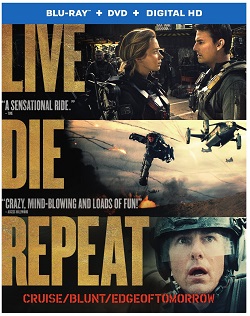 2014 had a lot of great movie releases, as you'll see in our Slackerwood Top Ten later this week. Picking out favorites was easy. Limiting them to just ten choices was much tougher.
2014 had a lot of great movie releases, as you'll see in our Slackerwood Top Ten later this week. Picking out favorites was easy. Limiting them to just ten choices was much tougher.
However, there's no question the following titles were big losers for the year, and I'll tell you why these are my picks.
10. Edge of Tomorrow
This Tom Cruise-starring adaptation of the Japanese manga All You Need is Kill was one of the critically best films of the year and thus its place at number 10. Unfortunately, due to uncertainty over marketing, the opening weekend box office take was just under $30 million for this $178 million blockbuster. As of September, it had barely grossed $100 million. It failed again with the home video release which had "Live Die Repeat" splashed across the cover causing confusion among people who had seen the marketing for the edgier title. (my review)
9. Interstellar
Do you science? You'd be a lot cooler if you did. This movie is a controversial pick with many people on the "loved it" side of the debate. Still, Interstellar was saddled with very high expectations that many felt it failed to meet. Notes circulated on some of the original script ideas that had many wanting something more than they got. Much as I enjoyed it, the final act abandoned hard science in favor of fantasy, and the sound problems reported from across the country were a distraction. (Marcie's review)
8. Godzilla
Another one of my dud entries that was actually a pretty good film. This year, and with this remake, "pretty good" wasn't good enough. Gareth Edwards' heart was in it, but he took too long to build up the action to the point where the audience really felt he should have started. The most common complaint was that the title character doesn't show up for the first 40 minutes of the two-hour movie. My biggest complaint was under-use of Bryan Cranston (and over-use of Aaron Taylor-Johnson). This only has a 6.6 rating on IMDb. (my review)
Review: Kingsman: The Secret Service
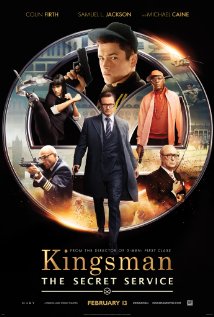 Filmmaker Matthew Vaughn's already well-established catalog (X-Men: First Class, Kick-Ass) gains a new entry this week with the release of his comedy spy adventure and arguably best film to date, Kingsman: The Secret Service. This James Bond meets Attack the Block romp was scripted by Vaughn and frequent collaborator Jane Goldman, and is based on the comic The Secret Service by Mark Millar and Dave Gibbons.
Filmmaker Matthew Vaughn's already well-established catalog (X-Men: First Class, Kick-Ass) gains a new entry this week with the release of his comedy spy adventure and arguably best film to date, Kingsman: The Secret Service. This James Bond meets Attack the Block romp was scripted by Vaughn and frequent collaborator Jane Goldman, and is based on the comic The Secret Service by Mark Millar and Dave Gibbons.
Taron Egerton stars as Eggsy, a study in wasted potential due to bad influences and an unsteady home environment who's recruited to a secret organization of upper-crust spies by Harry Hart, aka Galahad (Colin Firth). Only one recruit can complete the training, and Eggsy is at a disadvantage competing with his well-heeled rivals. This theme of class warfare is reflected in the larger story as quirky internet billionaire Valentine (Samuel L. Jackson) carries out an evil world-wide plot that the Kingsmen must foil.
Let's talk about Jackson for a minute. He is prolific, to say the least, and diverse, but his character Valentine is something entirely, hilariously different, with a comical lisp and vague OCD tendencies. The character is something of a clothes horse, always sporting stylish threads but wearing the same leather baseball hat in different colors to match his outfit. Valentine is an obsessive movie buff and as much a product of pop culture as a shaper of it. He rationalizes his twisted views with grade-school logic, and he's at once the most unique and memorable character Jackson has ever brought to life.
Jackson isn't the only character playing against type. Mark Strong, usually at home as the villain, appears here as Merlin, the technical expert. Firth, however, is as usual the perfect, polished English gentleman. The picture of refinement and class, he explains to Eggsy the origins of the Kingsmen among the elite tailors of London and the virtues of manners and a bespoke suit.
Kingsman: The Secret Service is exactly what you have come to expect from Vaughn. He cleverly riffs on spy films with satire, not spoof, delivering a continuous stream of laughter on top of an action story you can really sink your teeth into. I loved little throwaway lines like the mention of a shoe phone that call back to other spy properties, and spectacular fight choreography and effects lead to an explosive climax that is more over-the-top than anything Vaughn has done in his career.
Review: Jupiter Ascending
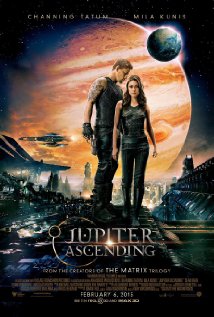 Lana and Andy Wachowski are two of my favorite current filmmakers. The Matrix rocked my worldview, and Cloud Atlas expanded my worldview, claiming a place as my very favorite movie. We've come to expect the very best from them, but not every movie can rock your world. Sometimes we have to settle for just "really damned good."
Lana and Andy Wachowski are two of my favorite current filmmakers. The Matrix rocked my worldview, and Cloud Atlas expanded my worldview, claiming a place as my very favorite movie. We've come to expect the very best from them, but not every movie can rock your world. Sometimes we have to settle for just "really damned good."
Jupiter Ascending encompasses the Wachowskis' grand visions of galactic empire within the confines of a relatively small action-adventure story. Their aesthetic, with a dreamlike quality, seems to draw on influences from every big science-fiction film of the past but mixes them together in new and original combinations. Immediately after it screened for press, Facebook and Twitter feeds were full of complaints from critics calling the movie a mess. It may not be for everyone. It misses a few beats, but it gets more right than it does wrong. If you're on the same wavelength as the Wachowskis, you should enjoy Jupiter Ascending as much as I did.
The story follows a Russian immigrant girl, named Jupiter because of her astronomer father's obsession with the planet, as she is attacked and aided by competing alien forces due to an accident of her birth. Her DNA is a perfect match for the eons-dead queen of a galactic empire, and the queen's heirs, her three children, each approach Jupiter in attempts to woo or threaten her and gain control of her now vast resources.
Mila Kunis is perfect for the role of Jupiter, with her combination of dark gorgeous looks and childlike innocence. In their interview with Hitfix's Drew McWeeny, the Wachowskis discuss their goal to make her a particularly feminine heroine rather than a female character who acts like a male hero. This is one goal I feel they failed to achieve, as time and again they place Jupiter in the position of damsel in distress so she can be rescued by Caine (Channing Tatum). This happens with such frequency that he becomes the hero of the story.
Review: Blackhat
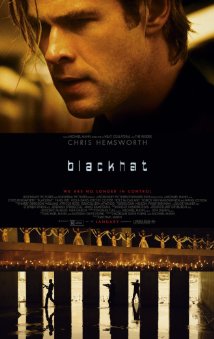 As someone whose alter-ego has a career in IT, I approach a film about hackers with lowered expectations. I don't want to dislike it, but I certainly have a heightened expectation that I will dislike it due to glaringly inaccurate portrayals of people doing things that to a trained eye are utterly ridiculous. What I never expected was that Blackhat would maintain an above-average level of accuracy in its portrayal and that my problems would mostly be the more mundane complaints a critic might have for any film that is just not very good.
As someone whose alter-ego has a career in IT, I approach a film about hackers with lowered expectations. I don't want to dislike it, but I certainly have a heightened expectation that I will dislike it due to glaringly inaccurate portrayals of people doing things that to a trained eye are utterly ridiculous. What I never expected was that Blackhat would maintain an above-average level of accuracy in its portrayal and that my problems would mostly be the more mundane complaints a critic might have for any film that is just not very good.
My largest complaint is a technical problem that has little enough to do with computers. The film is, even to a lay person, unfinished. A subpar audio mix makes dialogue at times difficult to understand. Poor or incomplete color correction results in inconsistency in the picture, which in the final action scenes looks exactly as if we're watching at home on a television with a 120fps frame rate enabled. This was the first movie that director Michael Mann shot completely without film, but his first digital outing is no excuse for failure to remove the "stock footage" watermark from a shot in the first five minutes of the film.
Reflecting on the experience, it seems as though Mann must have been in a tug-of-war with writer Morgan Davis Foehl, as he takes a methodical, largely boring script with uninteresting paper-cutout characters and tries to pull from late 80s and early 90s influences to liven it up. The camera zooms past a technician onto a keyboard and then inside a computer to a circuit board and then still deeper to a microscopic level where we see pulses of energy travelling through individual transistors in a chip. I could have almost thought for a moment I was watching Lawnmower Man or Electric Dreams.
"Blackhat" is a term applied to computer hackers who use their skills for good instead of nefarious purposes, staying on the right side of the law, a fact not mentioned in the film. The fact is also not precisely applicable to star Chris Hemsworth's character Nicholas Hathaway, a felon convicted for hacks that cause millions of dollars in damages to several banks. Actually, Hathaway, with skills that supposedly make him the only man capable of helping the FBI (in the form of Viola Davis) track down the bad guys, doesn't really do much in Blackhat that even qualifies as hacking. His biggest feat is tricking a director of security at the NSA into clicking an email attachment that wouldn't fool my mother.
Review: The Interview
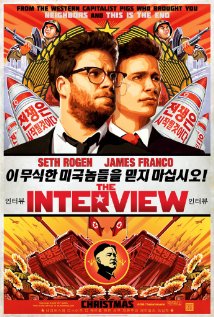 The great The Interview saga of 2014 has reached its apex. After the film was publicized, parent studio Sony Pictures found itself victim to the largest, most destructive and costly computer hacking operation in history. Emails, personal information of employees including social security numbers, and untold other secrets were not only stolen, but partially released by the culprits with a threat to do more damage if the movie was released. Last week, Sony caved to the major theater chains and cancelled the release, spawning innumerable conversations about free speech in the digital age.
The great The Interview saga of 2014 has reached its apex. After the film was publicized, parent studio Sony Pictures found itself victim to the largest, most destructive and costly computer hacking operation in history. Emails, personal information of employees including social security numbers, and untold other secrets were not only stolen, but partially released by the culprits with a threat to do more damage if the movie was released. Last week, Sony caved to the major theater chains and cancelled the release, spawning innumerable conversations about free speech in the digital age.
And just before that, I got to see it along with 200-ish other attendees at Butt-numb-a-thon, the annual birthday party for AICN founder Harry Knowles where vintage films are celebrated alongside big Hollywood premieres and sneak peeks. The Interview played fifth in the lineup of 12 films, immediately after Paul Thomas Anderson's Inherent Vice. Directors Evan Goldberg (This is the End) and Seth Rogen apologized during their introduction, saying they didn't expect to follow a Paul Thomas Anderson movie. In fact, the madcap hilarity was the perfect pick-me-up following the dark and low-key Inherent Vice as we approached the halfway mark of 24 hours of movie watching.
The Interview asks a question many have probably pondered: When a journalist is given an opportunity to interview one of the most hated dictators on the planet, wouldn't the U.S. government become involved to attempt an assassination? And would the journalist want to go through with it? Of course, if you've seen the previous work of those involved in this comedy, you know what to expect. Rogen and costar James Franco are this century's version of The Three Stooges, minus Moe (or perhaps replacing Moe with "Mo," the near-homosexual bro-fessional screen relationship they have together).
In the midst of their antics, I realized The Interview, like many great comedies, doesn't just lampoon its subject. It paints Korean dictator Kim Jong-Un as a caricature, a spoiled man-child twisted by his father into a creature that loves American culture but responds to criticism with extreme force and explosions of rage. But, it also pokes fun at the U.S. government, the traditional news media, and the American public's gluttonous fascination with info-tainment.
Review: The Hobbit: The Battle of the Five Armies
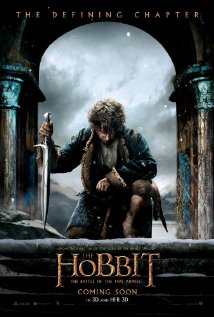 The greatest adventure may be what lies ahead, but The Hobbit: The Battle of the Five Armies is the end of the road for Peter Jackson's time in Middle Earth. The 13 years since the release of The Lord of the Rings: Fellowship of the Ring have seen the growth of the franchise into an international phenomenon while the digital filmmaking magic used in its creation has become commonplace in the industry, expanded and improved.
The greatest adventure may be what lies ahead, but The Hobbit: The Battle of the Five Armies is the end of the road for Peter Jackson's time in Middle Earth. The 13 years since the release of The Lord of the Rings: Fellowship of the Ring have seen the growth of the franchise into an international phenomenon while the digital filmmaking magic used in its creation has become commonplace in the industry, expanded and improved.
I was fortunate to have the chance to wait and see the presentation during the private Ain't It Cool Butt-numb-a-thon event, where it played in the HFR 48 frames per second but in 2D, not 3D projection -- the first (and perhaps only) time the film was screened for an audience with this kind of projection in the United States. While I find HFR with 3D to be headache-inducing, I quickly adjusted to the higher frame rate when it was 2D.
This third installment is appropriately named. Most of The Hobbit: The Battle of the Five Armies is concerned with events that play out as different races converge to loot the treasure under the mountain after the death of Smaug. But after the buildup over two previous films, the tumultous battle with the dragon, the climax of J.R.R. Tolkien's novel becomes merely an opening sequence here to set the stage for events that don't make much logical sense.
Thorin, leader of the company of dwarves, has found himself returned to his home inside the mountain and sitting atop a pile of gold ... and suddenly loses his sense of right and wrong, succumbing to a mysterious "dragon sickness" within the span of about 5 minutes it takes Smaug to fly out of the mountain and start burning everything in sight. His sudden onset of avarice leads him, like a drug addict, to break his promises, alienate his friends, and cost him that which he holds most dear. Meanwhile, the orcs who have been chasing the company throughout the three films are converging on the mountain with an overwhelming force.
Review: Exodus: Gods and Kings
 Cecil B. DeMille's 1956 epic The Ten Commandments is in no danger of being dethroned by this week's Ridley Scott-directed movie Exodus: Gods and Kings. This film has so many problems, I don't know where to start throwing the blame. Let's call this one (scripted by the brilliant team behind Tower Heist) the worst story that should never be told.
Cecil B. DeMille's 1956 epic The Ten Commandments is in no danger of being dethroned by this week's Ridley Scott-directed movie Exodus: Gods and Kings. This film has so many problems, I don't know where to start throwing the blame. Let's call this one (scripted by the brilliant team behind Tower Heist) the worst story that should never be told.
Perhaps we should start with the whitewashing of its cast. Christian Bale picks up Charlton Heston's sword as Moses, the slave prince. The central conflict is set up between him and Joel Edgerton's Rameses as a prophecy hints the adopted Moses might one day take his place as leader. Joining them are Sigourney Weaver who has no more than two lines as Rameses' mother and John Turturro as the wise old Pharoah Seti. I respect and admire Turturro's acting, but still have to suppress a chuckle that he has gone from playing "The Jesus" in The Big Lebowski to playing the Pharoah here. It is sad though that Turturro among the cast has the most gravitas, given the weight Heston and Yul Brynner previously brought to their roles.
Where Exodus really lost me, however, was not the cast but the script. In spite of the prophecy from the beginning of the film, it attempts to explain away the biblical story as the result of natural phenomena. God appears to Moses in the form of a creepy young boy only he can see as a result of a head injury. The plagues, which are rushed on and off-screen so quickly they hardly register, result from silt caused by the Nile flooding --which kills the fish, drives frogs out of the water, spawns disease. Even the parting of the Red Sea is presented as the result of an unnatural tide that occurs when a comet passes too close overhead. This conceit is a very half-assed attempt to rationalize events, which makes no attempt to explain the final plague.
All are naturally-occurring phenomena, but when presented as such, it takes away the magic and leaves a hollow emptiness where a greater story once stood. Exodus: Gods and Kings looks great with contemporary visual effects, but we're all familiar with the story, and this attempt to reimagine it with the spin of realism does it no favors.
Review: Horrible Bosses 2
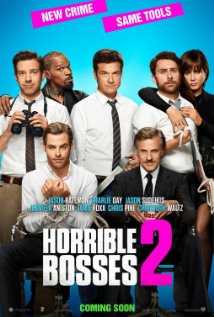 When you have something that really works you don't fuck it up. Horrible Bosses 2 doesn't make the mistake of screwing with the perfectly "horrible" premise of the original movie. Bateman, Day and Sudeikis are an unbeatable comedy team not equalled since Moe, Larry and Curly.
When you have something that really works you don't fuck it up. Horrible Bosses 2 doesn't make the mistake of screwing with the perfectly "horrible" premise of the original movie. Bateman, Day and Sudeikis are an unbeatable comedy team not equalled since Moe, Larry and Curly.
When studios land a hit comedy, the massive return on relatively miniscule investment guarantees a sequel. The Hollywood machine depends on finding a formula that works and milking it dry. Sticking as close to the established formula while changing things up enough to keep it fresh is the magic trick, and sometimes a production team can fail to pull it off. I was worried that would be the case here, that like The Hangover II, the laughs would fall flat for me.
I'm quite happy that my expectations for this film were not met. Director Sean Anders (Sex Drive) shares writing credits with John Morris (Hot Tub Time Machine), Jonathan Goldstein (Horrible Bosses), and John Francis Daley (Horrible Bosses), who's retired from his TV acting gig on Bones (as Dr. Sweets) to pursue writing and directing with a reboot of Vacation coming next year. Returning from the original cast are Jason Bateman, Jason Sudeikis, Charlie Day, Jennifer Aniston, Kevin Spacey, and Jamie Foxx with the pleasant additions of Christoph Waltz and Chris Pine.
The script follows the trio Nick (Bateman), Kurt (Sudeikis), and Dale (Day) as they have quit their jobs and seen their bosses sued, imprisoned or even killed and now set out to be their own bosses in the new company they've formed. Starting a business is a lot tougher than they planned, however, and the trio discovers their own ways to be horrible at being bosses.
As expected, the humor is very R-rated, crass, gross and outrageously funny. Right off the bat the characters find themselves in terribly embarrassing situations, and the tried and true method of "Tell, don't show... then show" works well. Stay at home for your turkey but then head to the theater, because this movie is well done.
Review: The Hunger Games: Mockingjay - Part 1
 The movie The Hunger Games: Mockingjay - Part 1 continues the series, taking it into darker, more adult territory. Fans of the books will not be disappointed. The third film sticks quite close to the events of the Suzanne Collins novel's first half, though the movie is slightly less bloody. Directed by Catching Fire's Francis Lawrence (I Am Legend, Constantine), Mockingjay is both faithful to the source and also timely commentary on the use of media to influence a revolution.
The movie The Hunger Games: Mockingjay - Part 1 continues the series, taking it into darker, more adult territory. Fans of the books will not be disappointed. The third film sticks quite close to the events of the Suzanne Collins novel's first half, though the movie is slightly less bloody. Directed by Catching Fire's Francis Lawrence (I Am Legend, Constantine), Mockingjay is both faithful to the source and also timely commentary on the use of media to influence a revolution.
Peter Craig and Danny Strong penned the screenplay, which picks up immediately after the events in Catching Fire. Katniss (Jennifer Lawrence) has been evacuated to the lost District 13, hidden in a vast complex of underground bunkers. As the clampdown by the government of evil President Snow (Donald Sutherland) on the rebelling districts continues, her best option to contribute to the revolution is to assume the role for which she has unwittingly been groomed and become the Mockingjay, an inspiration and example to the repressed peoples of Panem broadcast in propaganda videos over hijacked airwaves to all the districts. At the same time, her love and fellow Hunger Games champion Peeta is trapped in the Capital, used as an opposing figure begging for an end to violence in official broadcasts.
Until now, the series has always been told first-person from Katniss' perspective. For the first time here, we see just a few scenes with other characters: President Snow and his staff, District 13 President Coin (Julianne Moore) and Game Master Plutarch Heavensbee (Philip Seymour Hoffman) that set up the film as more of a direct conflict between Katniss and Snow. "Moves and counter-moves," muses Snow at one point, to emphasize that this is a chess match between the two, himself in white and Katniss in black. Caught up in the conflict between them, the districts are all in gray, and the grayest among them is 13.
Review: Rosewater
 When you browse to the CNN website, you can choose between US and international editions of the site. While both feature current news items, one edition is focused more heavily on stories about celebrity gossip, xenophobic fears and sports. The other focuses on stories about foreign politics, military activities and human-rights figures. I probably don't have to tell you which is which. The fact is, a majority of Americams don't care about what is happening in other countries. If they did, those stories would be the ones featured in the US edition of CNN, and you would already know the story of Maziar Bahari, the Iranian Canadian journalist imprisoned by the Iranian government for 118 days in 2009 accused of being a spy.
When you browse to the CNN website, you can choose between US and international editions of the site. While both feature current news items, one edition is focused more heavily on stories about celebrity gossip, xenophobic fears and sports. The other focuses on stories about foreign politics, military activities and human-rights figures. I probably don't have to tell you which is which. The fact is, a majority of Americams don't care about what is happening in other countries. If they did, those stories would be the ones featured in the US edition of CNN, and you would already know the story of Maziar Bahari, the Iranian Canadian journalist imprisoned by the Iranian government for 118 days in 2009 accused of being a spy.
If you have the slightest interest about happenings outside the US, especially in the Middle East -- an area typically ignored and/or misrepresented by most public education here -- you should consider Rosewater essential viewing. Jon Stewart, comedian, actor and host of the perennially popular The Daily Show, has brought Bahari's tale to the big screen after numerous appearances on his program, one of which figured heavily in his incarceration; the Islamic Republic used as evidence against him an appearance in which Jason Jones appeared dressed as a "spy" for comedic effect.
The import of this movie lies in its ability to help bridge the gaps in understanding that result from the holes in our knowledge and direct experience with Iranian culture. Stewart is new to filmmaking, and at times the feature looks more like a TV program than a film. Much of this is owing to the use of footage from various sources, news clips, even footage shot by friends of Bahari in Iran itself. Stewart edits it into a cohesive experience, but the mood shifts irregularly -- it shifts from documentary to drama and even to comedy. Throughout, however, runs a clear message: Governments control their citizens through information, and with the free flow of communication people can overcome an oppressive regime.
Rosewater's first act puts into perspective some things we take for granted. We have unlimited access to information, news, and culture unfettered by government interference, if we only seek it out. Gael Garcia Bernal as Bahari encounters an educated group of youths operating a "satellite university" where through illegal hidden satellite dishes, they access the world outside Iran's state-controlled media. As Bahari documents the 2009 election, voters swarm the polls, knowing little about the opposition candidate they support ... other than they'll vote for anyone who isn't Ahmadinejad. Before the polls are even closed, state-run media announce an overwhelming majority of the vote for Ahmadinejad in the rigged election. Bahari's mother Moloojoon (Shohreh Aghdashloo) represents the typical voter, unhappy with the Islamic regime but confused by the rampant propaganda on her TV. Meanwhile, rioting breaks out in the streets, and Bahari captures the violence on camera as guards begin firing on civilians, a video that results in his arrest.

